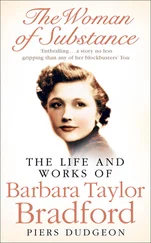Winston and Frank were helpless in their despair. Winston could not stand to see her suffering, and telephoned the family doctor, who arrived fifteen minutes later. Emma was given a sedative and the housekeeper helped her to bed. But racking sobs continued to convulse her and they did not cease for over two hours, when the sedative finally lulled her into a more tranquil state.
Her two brothers, Henry Rossiter, and the doctor stayed with Emma until she finally fell into a drugged sleep. As they left the bedroom, Winston said, ‘Her sorrow is only just beginning.’
Tragedy had struck at Emma many times in her life. It had caused her to falter, but it had never brought her to her knees. Paul’s death felled her with one swift blow.
All of her children, except Edwina, came home to be with her. They had loved and admired Paul, and they were aghast and grief-stricken, most especially Daisy, who had been the closest to him. Each one in their own way tried to comfort their mother, but their efforts were in vain.
Frank’s wife, Natalie, came immediately; Charlotte, Winston’s wife, and their son, Randolph, travelled up to London from Leeds with Blackie and his son Bryan, the four of them accompanied by David Kallinski and his sons, Ronnie and Mark. None of them could reach Emma and, after a brief visit with her in her bedroom, they assembled in the library, their faces clouded with anxiety.
Blackie attempted to alleviate their worry. He said, ‘Even the strongest heart can be broken, you know. But a strong heart always mends. I put my money on Emma any day. She’s a born survivor and she’ll survive this. Also, I think it’s much better she gets her grief out. I know she’ll be all right.’ And he meant every word, for he knew the stern stuff she was made of.
But for days Emma lay prostrate, half crazed and incoherent with grief. She became so debilitated at one point Winston seriously contemplated hospitalizing her. The dawn hours were the worst for Emma. She would lie motionless in her bed, bereft and without hope, watching the cold grey light creeping in, waiting for the beginning of a new endless empty day, staring vacantly into space like a blind woman. But her vivid and active mind was for ever in a turmoil, filled with conflicting and troublesome thoughts. She wondered if she had failed Paul in some way. Failed to properly convey over the years the depth and sincerity of her love for him. She castigated herself for not having gone to Australia when he had first had the accident, believing she could have prevented him from lifting that fateful gun. If she had not listened to him she could have saved his life, of that she was absolutely convinced. The weight of her guilt was heavy to bear, and her despondency and wretchedness only increased.
Henry Rossiter had told her of the doctors’ dismal prognosis, and slowly, as the shock receded, she began to dimly understand that a man like Paul, so virile, so powerful, would regard suicide as the only viable solution to his awful predicament, and yet sometimes she felt utterly abandoned and betrayed by him. However, mostly she was able to dismiss these feelings as manifestations of self-pity, a curious anger, which was baffling, and her own sense of powerlessness. It was also incomprehensible to her that Paul had not written, for she was unable to accept the fact that he would kill himself without one last word to her, and every day she looked for a letter, which did not come.
Winston, who had taken charge of the household and the Knightsbridge store, decided to keep Daisy at home from boarding school after the rest of the family departed. It was she who eventually reached Emma and brought her a measure of relief. Emma’s youngest child was surprisingly mature for a fourteen-year-old, and understanding beyond her years. Her own sorrow was acute, but she carefully strove to conceal this most of the time, and she finally achieved a real breakthrough with her mother. She persuaded Emma to eat a little every day, and gradually helped to stem the flow of tears with her loving presence. Occasionally Emma would look intently at Daisy and she would see Paul so clearly reflected in the child’s face her tears would start afresh, and she would cling to their daughter, calling for Paul. Daisy would wipe away the tears and calm her with soothing words, rocking her in her arms as if she were the mother and Emma the daughter.
One night, after Emma had collapsed again, Daisy tenderly cajoled her into a more peaceful state of mind, and for the first time Emma fell into a natural sleep that was heavy and deep. When she awakened several hours later she felt rested and had even acquired a degree of composure. She at once noticed Daisy curled up on the chaise dozing. And she suddenly saw her daughter objectively. With a flash of insight Emma recognized she had been burdening Daisy with her own grief when the child herself needed love and support. With a supreme effort she roused herself from her lethargy, and some of that strength, always formidable, began to trickle back into her weary body.
Emma got out of bed unaided and moved slowly to the chaise, her legs shaking and unsteady. Daisy woke up instantly and when she saw her mother bending over her she took hold of her hand swiftly, her eyes apprehensive. ‘Mummy, what is it? Do you feel ill again?’
‘No, darling. In fact, I think I’m a bit better.’ Emma took Daisy in her arms and held her close, stroking her glossy black hair. ‘I’ve been very wrong, Daisy, putting the burden of my grief on you. So wrong. Please forgive me, darling. Now, I want you to get ready for bed and have a really good night’s sleep. And I don’t want you to worry about me any more. I will be fine. And tomorrow I am going to send you back to boarding school.’
Daisy pulled away and stared at Emma in surprise, and her vivid blue eyes were brilliant with tears. ‘But I want to stay with you, Mummy. To look after you. Paul would want that. He really would. He wouldn’t want you to be alone, Mummy.’
Emma smiled gently. ‘You’ve been looking after me very well, and now it’s my turn to look after you. I am going to be all right, darling. Truly I am.’
Daisy began to cry and she buried her head on Emma’s breast, sobbing as if her heart would break. ‘Hush, darling. Hush,’ Emma murmured. ‘We must be strong and brave, and help each other in the coming months.’
‘I’ve been so afraid, Mummy.’ Daisy sobbed, her tears drenching Emma’s crumpled nightgown. ‘I thought you were going to die, too.’
Emma said, in a voice that was surprisingly steady, ‘I am not going to die, Daisy, I have you to live for now.’
It was a glorious afternoon in late September, sunny and warm and with a cloudless sky that was radiant with light. But Emma shivered as she walked wearily across the drawing room. She huddled in a chair in front of the fire, warming herself, her thoughts on her sons. War had been declared on September 3, and although she had been too bereaved to pay attention then, the situation could no longer be ignored. Britain was mobilizing with the same speed and efficiency it had displayed in her youth, and she knew that they would be in for a long siege.
Feeling warmer, she shifted in the chair. As she did a shaft of bright sunlight illuminated the ravages her grief had wrought. She had shed pounds and looked painfully thin in the simple black wool dress, its severity unrelieved by jewellery. The only pieces she wore were Paul’s rings, and a watch. But her hair was bright and crackling with life.
‘Here I am, me darlin’,’ Blackie called from the doorway, startling her. She rose to greet him, managing a smile. ‘It’s lovely to see you, Blackie dear,’ Emma said, embracing him.
He enveloped her in his arms and held her tightly to his broad chest, and he choked up as he felt the fragility of her body. She was a bag of bones. He held her away, looked down into her face, and put his hand under her chin. ‘You’re a sight for sore eyes, mavourneen. It’s grand to see you up and about.’
Читать дальше
Конец ознакомительного отрывка
Купить книгу












